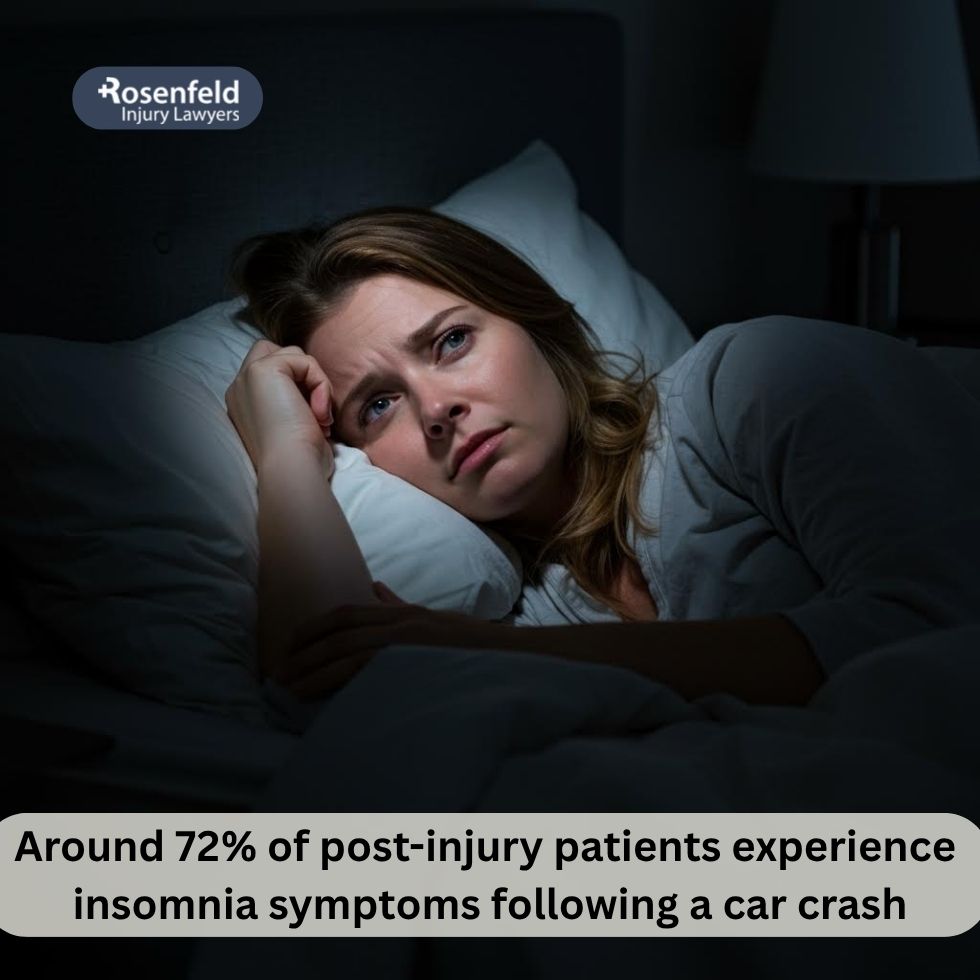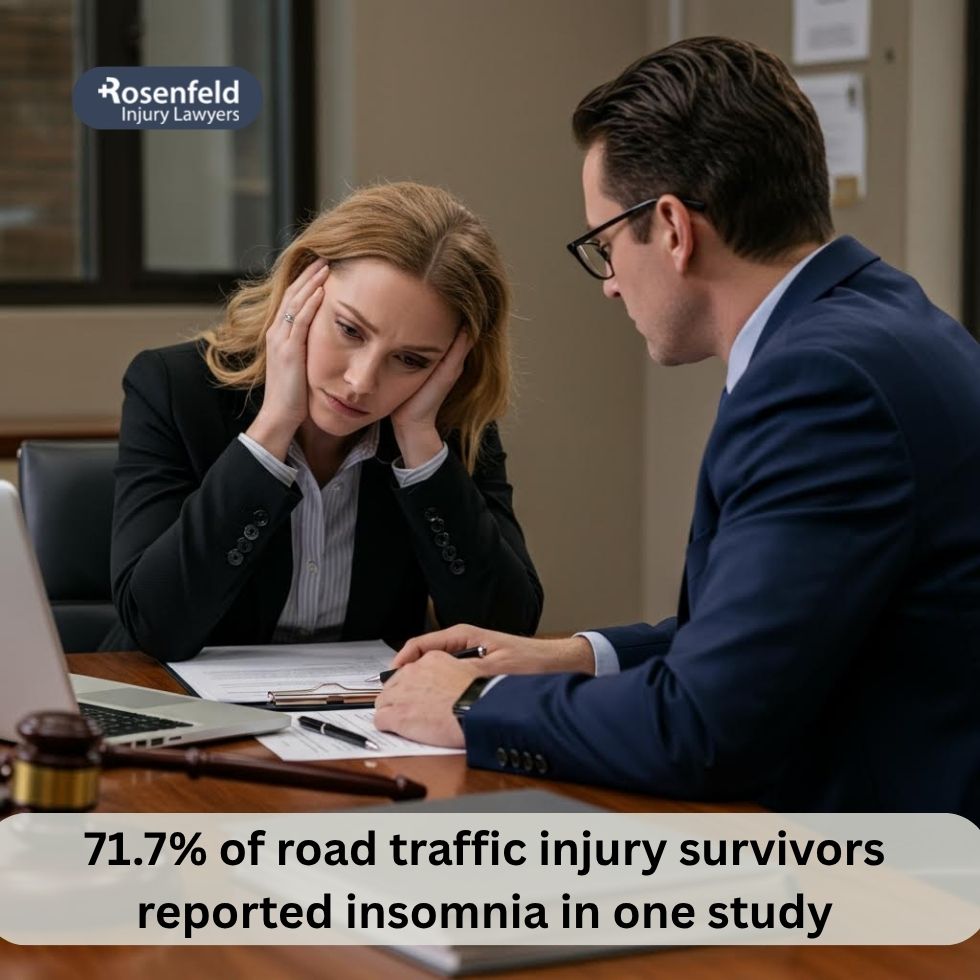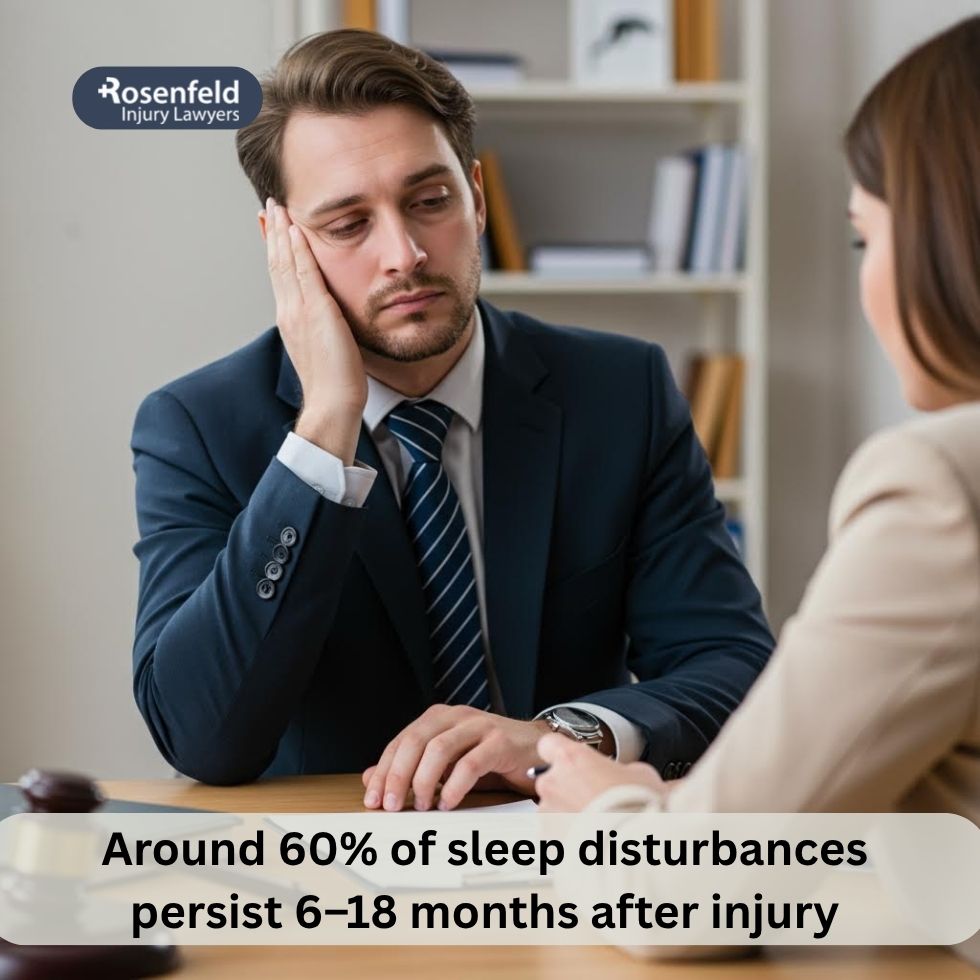- 24/7 Free Consultation: (888) 424-5757 Tap Here To Call Us
Sleep Problems After a Car Accident
Sleep problems, such as insomnia, are common after a car accident. The stress, trauma, and pain can interfere with normal sleep patterns. Whether you’ve experienced physical injuries or not, sleep problems after a car accident can have a significant impact on your health and well-being.
Sleep patterns are often disrupted by the emotional and physical toll of a car accident, and it can interfere with your body’s healing process. Traumatic events, like car accidents, can lead to emotional and physical challenges, including:
- Anxiety
- Stress
- Pain from soft tissue injuries and other physical injuries sustained
Understanding the connection between trauma and sleep disturbances is crucial for recovery. In this article, we’ll explore the common sleep issues faced by those involved in car accidents, their impact on daily life, and practical strategies for regaining quality sleep.
Relaxation techniques, such as deep breathing exercises or lifestyle adjustments, can help you reclaim peaceful nights and protect your overall health.

How a Car Accident Can Lead to Sleep Problems
A car accident can result in both physical and psychological trauma, leading to crash-related sleep problems. Common causes of sleep disturbances after an accident include:
- Pain and discomfort from injuries;
- Anxiety, stress, or post-traumatic stress disorder (PTSD);
- Changes in the brain’s sleep-wake cycle due to concussions or other head trauma;
- Prescribed pain relievers can result in trouble falling asleep or excessive sleepiness.
A car accident can result in a traumatic brain injury (TBI). A TBI is a brain injury caused by an outside force and can have consequences ranging from mild to life-threatening. Thirty to seventy percent of those with a traumatic brain injury report having sleep difficulties.
The aftermath of a car accident can result in social withdrawal or isolation, primarily if physical mobility is restricted. A lack of social interaction can contribute to depression and anxiety, both of which can disrupt sleep.
Creating a comfortable sleep environment, establishing a consistent sleep routine, and finding the right comfortable sleeping position can help mitigate the challenges of overcoming physical injuries and quality sleep.
A Chicago car accident lawyer can help injured victims get the compensation they deserve.
Types of Crash-Related Sleep Problems
Experiencing a car crash can have profound impacts on every aspect of your life, including sleep patterns. Understanding the different types of sleep disturbances that can arise after an accident is crucial for recovery.
Addressing these issues can lead to improved physical health, mental clarity, and the ability to resume everyday activities. After a car accident, victims may develop a range of sleep issues, including:
Insomnia
Stress and trauma from a car accident can make it difficult to fall or stay asleep. Symptoms of insomnia include:
- Racing thoughts about the accident;
- Waking up frequently during the night;
- Difficulty falling asleep and difficulty staying asleep;
- Feeling exhausted during the day.
Insomnia may be a short-lived response after a traumatic event, or it can be a long-term problem with serious consequences.
Excessive Sleeping
Some accident victims experience excessive daytime sleepiness due to the body’s natural healing response. Restorative sleep is a natural response to emotional trauma or car accident injuries. However, if excessive sleep continues beyond the initial recovery phase, it may indicate:
- Depression
- Concussion or brain injury
- Chronic pain-related fatigue
You should seek medical attention immediately if the excessive sleepiness starts after a potential head injury.
Nightmares and PTSD-Related Sleep Disorders
Nightmares and vivid dreams about the car accident can disrupt sleep, leading to anxiety and fear of sleeping. Nightmares are common among those with Post Traumatic Stress Disorder (PTSD) and can lead to significant sleep disturbances and increased anxiety.
Hypervigilance is where victims remain overly alert and unable to relax as a result of PTSD. Persistent difficulty falling asleep and sleep disturbances are common in PTSD.
Establishing a consistent sleep routine and practicing relaxation techniques can enhance the quality of sleep. Those struggling with these issues can also benefit from seeking support from a mental health professional.
Pain-Related Sleep Disturbances
Car accident injuries, such as whiplash, fractures, neck pain, or muscle strains, can make it difficult to find a comfortable sleeping position. Staying asleep can be difficult due to pain.
Let your doctor know if pain from your injuries or other physical symptoms interferes with sleep quality. Your doctor may prescribe a short course of sleep medication to ensure that physical pain doesn’t interfere with restful sleep, which is crucial to healing.
Why Seeking Medical Attention is Critical
It is important to seek prompt medical attention after a car accident. During a car accident, our bodies release adrenaline and other brain chemicals that can mask the symptoms of an injury. Whether you feel pain or not, you should be evaluated by a medical professional soon after an accident.
A doctor can diagnose and treat conditions that may interfere with sleep quality, including:
- Concussions and traumatic brain injuries (TBIs)
- Neck and back pain from spinal injuries
- Chronic pain disorders that interfere with rest
Disturbed sleep patterns are one of the most common complaints from TBI patients and can exacerbate morbidity and long-term consequences. Sleep and TBIs are linked through neurophysiological mechanisms that play a crucial role in recovery from the injury.

How to Improve Sleep After a Car Accident
Sleep problems after a car accident don’t always have an easy solution. However, you can take steps to improve sleep quality and get back to a good night’s sleep. These include:
- Follow pain management recommendations, including physical therapy, prescribed pain medications, or lifestyle adjustments for physical injuries sustained during the accident.
- Consider cognitive behavioral therapy (CBT) to address stress or PTSD-related sleep issues.
- Create a sleep-friendly environment. Use comfortable bedding, minimize noise, use a sound machine if it’s soothing to you, and keep a regular bedtime routine.
- Seek emotional support, utilizing tools such as therapy, support groups, or talking with friends and family members.
- Limit screen time before bed. Scrolling devices or watching TV may seem like a good way to unwind and prepare for sleep, but studies have proven that the blue light emitted by screens can disrupt sleep patterns.
Remember, recovery takes time, so be patient with yourself when you’re trying to reestablish healthy sleep patterns.
Can You Recover Compensation for Crash-Related Sleep Problems?
If your difficulty sleeping is linked to a car accident, you may be eligible for compensation through a personal injury claim. It’s difficult to predict what your claim may be worth, but a skilled Chicago personal injury attorney can tell you about typical car accident settlements.
You may be entitled to damages for:
- Medical bills (doctor visits, physical therapy, sleep studies, therapy, medications);
- Pain and suffering, including mental distress from sleep problems;
- Lost wages if sleep disturbances affect work performance;
- Loss of quality of life due to chronic sleep disruption
Sleep problems after a car accident can range from a minor inconvenience to a life-altering problem with profound impacts on your physical health. If your physical or mental health has suffered because of trouble sleeping as a result of a car accident, Rosenfeld Injury Lawyers can help you recover the compensation you need while allowing you to focus on your physical recovery.

How an Experienced Car Accident Lawyer Can Help
If you’re suffering from sleep problems after a car accident, a Chicago car accident lawyer can:
- Gather medical records linking your sleep problems to the crash.
- Negotiate with insurance companies for fair compensation.
- Work with medical experts to support your claim.
- Take legal action if necessary to recover damages.
Additionally, your lawyer may collaborate with medical experts who can provide professional insights that strengthen your case, explaining how the accident contributed to your sleep problems. If negotiations do not result in a fair settlement, Rosenfeld Injury Lawyers are prepared to take legal action to pursue damages through a lawsuit.
Talk to a Car Accident Attorney About Your Sleep Problems

Don’t let sleep problems after a car accident take over your life. If you’re struggling with insomnia, nightmares, or excessive fatigue due to a crash, you may be entitled to compensation for your medical expenses, lost wages, and emotional distress. Rosenfeld Injury Lawyers are ready to fight for your rights to help you recover the damages you deserve.
Contact us today for a free consultation. We will review your case, explain your legal options, and work to secure the best possible outcome for you.
All content undergoes thorough legal review by experienced attorneys, including Jonathan Rosenfeld. With 25 years of experience in personal injury law and over 100 years of combined legal expertise within our team, we ensure that every article is legally accurate, compliant, and reflects current legal standards.







